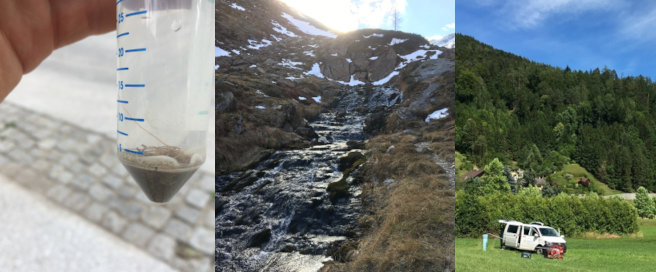Impact of extreme events on the quantity and quality of groundwater in alpine regions – multiple-index application for an integrative hydrogeo-ecologocal assessment.
Freshwater ecosystems in mountain areas are considered important water resources and biodiversity hotspots that are highly sensitive to changes in climate. The Alpine region is known to be particularly affected by climate change, including changes in hydrological extremes such as droughts and floods, which are expected to become more frequent and intense in the future. Aquifers can mitigate the impacts of hydrological extremes, as their storage attenuates floods and sustains baseflow of surface waters in times of drought. Yet, groundwater itself is vulnerable to hydrological extremes in terms of both quantity and quality. Despite the importance of groundwater as a primary water resource, climate change impacts on groundwater quality, including those resulting from hydrological extremes, have been rarely addressed to date. Another aspect is that groundwater quality monitoring as currently operated focuses on physical-chemical indicators, whereas groundwater ecological features such as biodiversity and ecosystem functioning are still hardly considered.
Against this background, our project addresses the following overarching research question: How do groundwater systems in an alpine and prealpine environment respond to extreme hydrological events such as droughts, heavy rain and floods in terms of water quantity and chemical quality as well as ecological status? To address this question four field sites within the Mur valley (Styria, Austria), comprising alpine and prealpine areas, different types of hydrogeological settings as well as different human impacts have been selected for targeted investigation. The long-term and event-based monitoring data will be used to evaluate the effects of extreme events on groundwater hydrological, hydrochemical and ecological status. Both short-term responses to hydrological extremes and long-term trends will be examined with regard to differences between the Alpine region and the foreland as well as between different types of hydrogeological settings and related to human impacts. To advance the current understanding of the interrelation of groundwater quantity and quality responses to hydrometerological extremes, correlations between hydrological, hydrochemical and ecological trends and responses will be disentangled and causal relationships and key drivers identified using methods of time series analysis and multivariate statistics.
In addition to providing improved scientific understanding of the interrelation of short-term effects and long-term trends in groundwater quantity and quality, this project aims to establish the foundation of an integrative hydrogeo-ecological assessment of alpine and prealpine groundwater systems in Austria. As particularly the assessment of potential long-term ecological impacts of extreme events on groundwater systems requires on-going monitoring efforts, it is intended to continue selected assessment and monitoring activities initiated in this project in close collaboration with non-scientific actors from the relevant regional authorities. To this end, indicators that turn out sensitive and useful for evaluating and monitoring the effects of climate change on groundwater quantity and quality will be directly validated and implemented. As the suitability of these indicators depends on the science or policy questions to be addressed, it is intended from the beginning to integrate a broad range of stakeholders in this process and to connect to similar efforts in other European countries.
